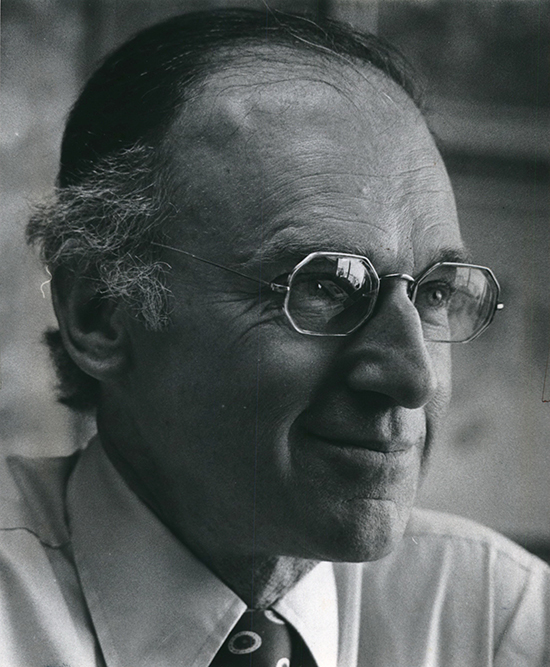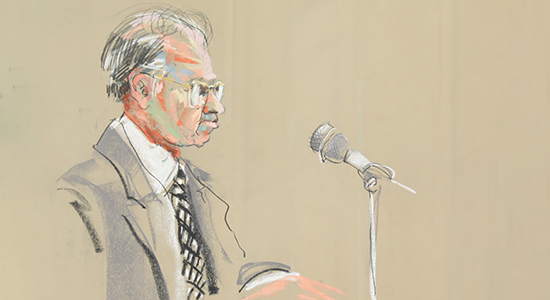“I am not bound to succeed, but I am bound to live up to what light I have.” – Abraham Lincoln
Irvin B. Charne, a prominent Milwaukee lawyer, died Jan. 10, 2018, at the age of 95 after a long illness. During his outstanding career, Irv earned many awards and tributes. A 1978 Milwaukee Journal article said that Irv enjoyed a reputation “as a thorough and shrewd legal strategist” and “one of Milwaukee’s finest trial lawyers.” But he was far more than that, which is why 27 of us who had the privilege to practice law with him wanted to pay tribute to him.
The son of immigrants, Irv was raised in Milwaukee. After serving in World War II, he married Merla, and they moved to Madison where Irv attended the U.W. Law School. He graduated in 1949, Order of the Coif, and returned to Milwaukee to become law clerk to U.S. district court Judge Robert Tehan. Irv soon founded his own law firm, which ultimately grew to 35 lawyers.
Shortly after founding his firm, Irv and Merla became parents to sons Jim and David. Irv adored his wife and sons. Although he was proud that both sons became lawyers, he encouraged Jim in his work in the music industry and David in doubling as a performing clown.

In 1976, federal Judge John Reynolds appointed Irv Charne to represent the class of plaintiff school children to assist Milwaukee civil rights lawyer Lloyd Barbee in the suit Barbee had brought in 1965. Photo: Allan Y. Scott, 1976, Milwaukee Journal Sentinel. Used with permission.
Big Clients, Big Risks, Big Results
Irv was best known during his legal career for his work on Milwaukee school desegregation cases. In 1976, federal Judge John Reynolds appointed Irv to represent the class of plaintiff school children to assist prominent Milwaukee civil rights lawyer Lloyd Barbee in the suit Barbee had brought years earlier, in 1965, against the Milwaukee Public Schools. A court-approved settlement calling for sweeping measures to desegregate the schools was reached in 1979. A few years later, Irv’s former opponent, the Milwaukee Public School District, retained him to represent it in its suit to desegregate the surrounding suburban school districts. A settlement provided for the transfer of students between the city and suburbs.
In the 1970s, Irv successfully represented Gov. Lucey and Gov. Schreiber in original actions before the Wisconsin Supreme Court to defend their creative use of their partial-veto authority. The legal precedents that resulted from these cases caused Wisconsin to have one of the most powerful partial-veto authorities for a governor among all 50 states.
Irv often represented big business or big labor. But in the 1960s, in a pioneering lawsuit in Wisconsin, he successfully sued a large corporation and a labor union on behalf of three women who were seeking pay equal to what their male coworkers received for the same work.
This was not Irv’s only pioneering legal work. He represented Congressman Henry Reuss in several lawsuits in 1971 to stop environmental degradation to Wisconsin rivers. This was before modern federal environmental laws were on the books. Relying on the Refuse Act from the prior century – which made it illegal to discharge anything into a navigable body of water without a discharge permit from the U.S. Army Corps of Engineers – Reuss brought a series of qui tam actions against the offending polluters and the U.S. Army Corps of Engineers.
Several years later, one of the largest paper companies in Wisconsin called on Irv to represent it in challenges to wastewater permits shortly after the Clean Water Act was enacted. Irv’s representation of the paper company in an early challenge to wastewater permits created a virtually new practice in environmental law for many of us who practiced with him in this area.
Irv was also involved in several big insolvency or reorganization cases. He was appointed by the Wisconsin Insurance Commissioner as liquidator for a large insurance company. Later, he handled a nearly $1 billion claim by a consortium of banks in another insurance company reorganization matter. Irv also represented the first religious order ever to seek bankruptcy protection.
Poor People, Unpopular Causes, Zealous Representation
In addition to representing the rich and powerful, Irv also represented low-income individuals and other people who could not get quality legal representation.
In 1955, Irv served as volunteer counsel to the secretary of the Wisconsin Communist Party, who had been subpoenaed to appear before the House Un-American Activities Committee in Milwaukee during the Sen. Joseph McCarthy era. The subject of the hearing was communist activities in Wisconsin.
In 1971, the U.S. Supreme Court appointed Irv to represent a prisoner in a case challenging Wisconsin law permitting open-ended commitments of sex offenders in lieu of sentence. In a letter received after briefing and oral argument, which led to a decision remanding the case to the trial court for further action, Chief Justice Warren E. Burger wrote, “You acted at the request and by appointment of the Court. … and I wish to express the Court’s appreciation for the assistance to us and the Petitioner.”
Irv treated all people with respect and dignity – whether they were his client or colleague, or an opponent; his peer at bar or a new attorney; the powerful or the common person.
Irv always believed passionately that everyone deserved zealous representation and that representation should be available regardless of ability to pay. Putting that belief into action resulted in pro bono appointments by members of the firm, including representing defendants charged with first-degree murder. This was before there was a public defender system. Irv encouraged lawyers in his firm to handle such matters knowing the fees paid to the firm would be very low. Two murder cases resulted in not-guilty verdicts and another the reduction in sentence to second-degree murder.
In 1990, anti-Indian groups had repeatedly gathered at boat landings in northern Wisconsin to forcibly prevent Chippewa Indians from exercising their treaty-reserved, court-affirmed, off-reservation fishing rights. The American Civil Liberties Union of Wisconsin had raised money to cover out-of-pocket litigation costs but needed a law firm capable of litigating a complex and controversial federal civil rights case with no assurance of compensation. Predictably, the ACLU approached Irv, and he agreed to take the case; the result was a permanent federal court injunction against interference with off-reservation Chippewa treaty fishing rights. The boat landings have been peaceful during the treaty harvest ever since.
Serving the Bar and the Justice System

Photo: A court sketch artist drew this likeness of Irv Charne delivering closing arguments during the Milwaukee School Board desegregation case. The case settled in 1979. In those days, cameras were not permitted in the courtroom.
In addition to zealously representing clients and causes, Irv served the broader community of lawyers and the justice system. He served terms as president of the Milwaukee Junior Bar Association, a governor of the State Bar of Wisconsin, and president of the Seventh Circuit Bar Association.
He was chair of the U.W. Law School Board of Visitors, president of the U.W. Law School Alumni Association, and chair of the law school’s national fund campaign.
Irv served on judicial selection committees, legislative council committees, Wisconsin’s Court Reorganization Committee, and the American Law Institute. He also was on the boards of the Center for Public Representation and Legal Action of Wisconsin and was an emeritus trustee of the Lawyers Committee for Civil Rights Under Law.
Irv’s many honors reflected not only his brilliance as a lawyer but also his integrity, commitment to public service, and humanity.
In 1988, Irv received the Distinguished Alumni Award from the U.W. Law School. In 1999, he was honored with the American Inns of Court’s Professionalism Award for the attorney in the federal Seventh Circuit who best exemplified the ideals of the Inns. Then, in 2005, the Eastern District of Wisconsin Bar Association presented Irv with its Judge John Reynolds Community Building Award.
Respect, Dignity, Integrity
Those of us who practiced with Irv know firsthand that Irv’s professional and personal lives were characterized by the highest ethical standards and unquestioned integrity. He treated all people with respect and dignity – whether they were his client or colleague, or an opponent; his peer at bar or a new attorney; the powerful or the common person.
In a profession notorious for its aggressive personalities, Irv Charne was a model of civility – even kindness. This in no way, however, diminished his effectiveness as an advocate. On the contrary, according to a well-known story, Irv had once cross-examined an opposing party in his customary soft-spoken, deferential manner. When he was finished, the party boasted to his lawyer that he had gotten the best of Irv, to which the lawyer responded: “You may not know it, but he just destroyed your case.”
Irv was an early supporter of women lawyers and judges and cowrote an article in the predecessor of the Wisconsin Lawyer titled “Assets Not Liabilities: Women Lawyers in the Firm.” He mentored new attorneys, patiently teaching them how to be good lawyers while at the same time encouraging them not to be slaves to their practices but to be devoted to their families and community service. Despite all his legal work and service to legal organizations, Irv found time to serve as president, counsel, and on the boards of community and religious organizations too numerous to list.
None of us have reached the pinnacle of professional success that Irv Charne did, but we can all aspire to be better lawyers by following in the footprints of Irv’s life. In the words of Abraham Lincoln: “I am not bound to win, but I am bound to be true. I am not bound to succeed, but I am bound to live up to what light I have.” Irv Charne certainly lived up to his light. While we will truly miss him, we cherish and continue to be inspired by his memory and his legacy of professional excellence, service, and personal integrity.
Acknowledgements: The following colleagues of Irv Charne participated in preparing this tribute: John Bannen, Barbara Becker, Gregory Burce, Lawrence Clancy, Adrian Cohen, Brendan Comer, Robert Corris, Catey Doyle, James Hall Jr., Arthur Harrington, Margaret Hickey, Ronald Jacobs, Myron Joseph, Ann Kerns Comer, Raymond Krueger, Richard Lenz, Michael Levey, William E. McCarty Jr., Thomas McElligott, Keith McGlamery, F. Thomas Olson, Brian Pierson, Howard Pollack, Michael Runde, Howard Tolkan, John Van Lieshout, and Thomas Williams.
The following partners at what ultimately became Charne, Glassner, Tehan, Clancy & Taitelman s.c. and who predeceased Irv include the Hon. Thomas Fairchild, William E. Glassner Jr., Robert E. Tehan Jr., Donald S. Taitelman, and Donald Kiesling.
